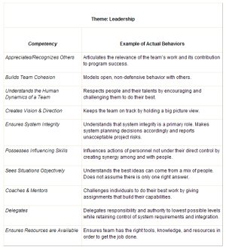November 25, 2008 Vol. 1, Issue 11
The behaviors and characteristics of outstanding systems engineers were the subject of a six-month study led by Christine Williams, Director of the Systems Engineering Leadership Development Program.

Click image to view the five broad themes with associated competencies and their observable behaviors.
As with every profession, certain individuals stand out. They become the “go to” person whenever a difficult problem or question arises. For NASA projects, that person is typically the Chief Systems Engineer. Because of the critical role these individuals play, NASA Administrator Dr. Michael Griffin directed the agency to accelerate the development of employees who exhibit the qualities of these go-to individuals. This led to the question, “What exactly are those qualities?”
To answer that, NASA studied 37 of its most highly regarded systems engineers to identify the characteristics or behaviors that set them apart. The findings of this study will be used to enhance the development of NASA systems engineers.
Engineering leadership from each of NASA’s field centers identified highly regarded systems engineers for inclusion in this study. The number of individuals studied varied by field center. A team of internal NASA employees and contractor staff with backgrounds in organizational development or applied behavioral sciences conducted the study.
Members of the study team interviewed, shadowed and observed the system engineers. Shadowing and observation involved one or more days of watching and documenting a system engineer performing his or her day-to-day activities, such as attending reviews, team meetings, and engaging in individual work.
The results fell into five broad themes with associated competencies and their observable behaviors. The broad themes were: leadership; attitudes and attributes; communication; problem solving and systems thinking; and technical acumen.
The study found that there is a set of specific observable and measurable behaviors that are shared by excellent system engineers at NASA. The qualities that differentiate these individuals from their peers are the skills of professional practice such as creativity, curiosity, self-confidence, persistence and understanding of human dynamics. While these behaviors come more naturally to some than to others, they can be developed and learned.





